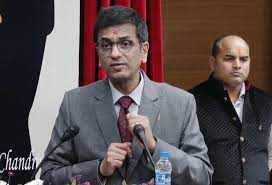Chief Justice of India (CJI) DY Chandrachud exhorted senior members of the bar association to pay decent salaries to the juniors, especially in big cities, in order to enable them to live a life of dignity. He said senior lawyers should not treat their juniors as slaves just because they themselves had to learn the law the hard way when they were starting out in this field of law.

While speaking at a function organized by the Bar Council of India to congratulate him for recently taking up the mantle as the Chief Justice of India, he said that the time has now changed and it is difficult to survive in big cities like Delhi, Mumbai, Bangalore or Kolkata without a decent salary.
He asked the seniors to stop treating their juniors the way they were treated during their early lives in the profession. This was the old rabble principle at Delhi university, he added.
In this regard, CJI highlighted how it is difficult for juniors to survive in big cities without adequate pay.
“How many seniors pay their juniors decent salaries? If you are staying in Delhi, Mumbai, Bangalore or Kolkata how much does it cost for a young lawyer to survive. Even in a place like Allahabad, a young lawyer coming in from another district, you have to find a place to stay, rent to pay, transportation, food. Our young lawyers don’t even have chambers where they are paid money. That must change and the burden of doing that is on us as senior members of the profession,” he said.
In his speech, the CJI also highlighted the system of recruitment of juniors prevailing in the legal profession.
“In our profession is it not a very common place that juniors find seniors on the basis of an informal network. Some will call it an old boys club. We do not have a merit based method of selecting young lawyers who will be recruited to chambers,” he said.
Hence, he underscored the importance of opening up the legal profession to all sections of the society from its current patriarchal and caste-based structure.
“This structure of the legal profession, which is patriarchal and sometimes so caste based, has to change so that we as lawyers discharge our duties to our society to make the legal profession open up to people from different communities and marginalized groups in our society,” he emphasized.
He stated that those who were ragged always ragged those below them because it was a way of passing on the blessing of being ragged. Sometimes it got very bad or worse. But here the point is that seniors today cannot say how they learned law the hard way, and therefore they will not pay their juniors.
Justice Chandrachud always remembered a conversation with his friend that he had asked him over a cup of tea “ Ab tu kya karega ? Zindagi Kaise Guzaraga ?” that he would earn a living by practicing law. His friend has advised him “why did you get gas agency or retailer oil dealership so that you have sufficient means to sustain yourself?” This thought has reflected the truth about our profession.
He highlighted when you have top notch advocates supreme court who could have seven to eight video conferencing screens open so that they could move from court to court with flick of mouse. After the reopening of the courts, juniors run to the court to resolve all the issues related to hearing, then seniors have to pay them for their livelihood.
Legal profession “an old boy club” for junior advocates
CJI said that the legal profession is an old boy club where opportunities are given to only a selected group in a network. There is a responsibility to ensure that young people are not deserted and optimism is kept alive.
READ MORE:The current collegium system is out of sync, and needs to revamp, says Mukul Rohatgi












